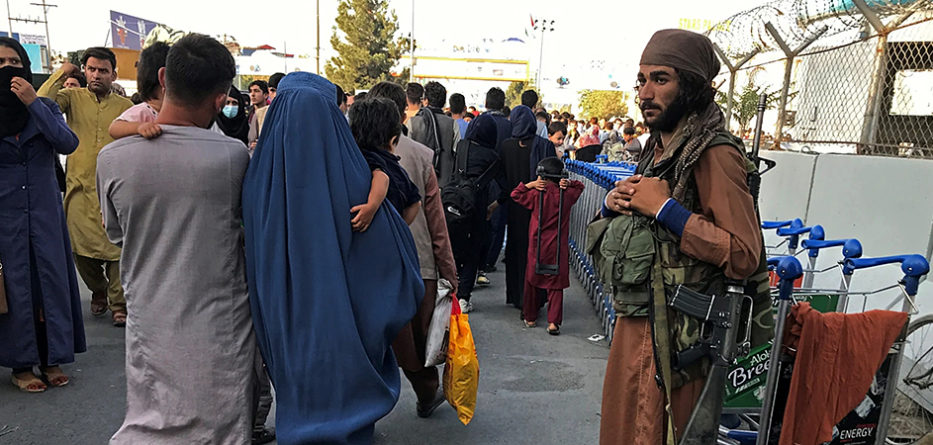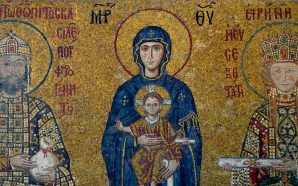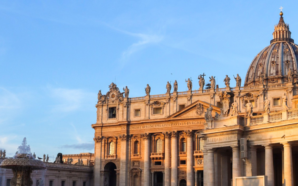Homily for the 26th Sunday in Ordinary Time
107th World Day of Migrants and Refugees
Readings: Numbers 11:25-29; Psalm 18 (19): 8, 10, 12-14; James 5:1-6; Mark 9:38-43, 45, 47-48
26 September 2021
Today is the 107th World Day of Migrants and Refugees. The Church has been marking this day every year for over a century, long before the establishment of the United Nations, and long before the establishment of the United Nations High Commissioner for Refugees (UNHCR). As usual Pope Francis has issued a message. This year his message is entitled, “Towards an ever wider ‘we’”. Because the wheels of the Vatican move slowly, his message was published back in May, long before the tragic events that unfolded in Afghanistan last month. The end of Australia’s 20 year commitment of troops in Afghanistan and the renewed takeover by the Taliban provides a keen focus for us Australians reflecting on how we might take up the challenge put by Pope Francis to “think no longer in terms of ‘them’ and ‘those’, but only ‘us’.”[1]
LISTEN: https://soundcloud.com/frank-brennan-6/homily-world-day-of-migrants-and-refugees
Francis puts a direct challenge to us as Church before then putting a more general challenge to all people of good will that we might create an ever more inclusive world. To us as the Catholic Church, he says: “the Church is called to go out into the streets of every existential periphery in order to heal wounds and to seek out the straying, without prejudice or fear, without proselytising, but ready to widen her tent to embrace everyone.” It’s this sort of challenging statement from Pope Francis which has Catholics like Cardinal George Pell wondering what the pope is up to. During the week, Cardinal Pell, who is back in Rome, appeared on a Webinar entitled ‘The Church Up Close,’ providing information for journalists of all shapes and sizes wanting to understand more about the internal workings of the Catholic Church. Cardinal Pell was interviewed for 80 minutes providing some frank observations about his working relations with 3 popes – John Paul II, Benedict XVI and Francis. His preference for the other two over the present incumbent was clear. We are a broad church and it’s good that we have got to the stage where everyone including cardinals can indicate their preferences.
During the interview, Cardinal Pell was asked, “Why is there such opposition to Pope Francis amongst conservative Catholics?” He replied, “A lot of conservative Catholics feel a little bit confused, a little bit uncertain. They wonder just what is being taught. Pope Francis has a great gift, like Jesus did, for reaching out for those on the peripheries and for ‘sinners’ (in inverted commas) in categories which aren’t always seen in the front row of church. That has confused people but we are where we are. The papacy is something, I believe, that is willed by Christ and we have to respect the office, reverence the man, and obey the papal directions.”[2]
In today’s gospel, John says to Jesus: “Master, we saw a man who is not one of us casting out devils in your name; and because he was not one of us we tried to stop him.” But Jesus said, “You must not stop him: no one who works a miracle in my name is likely to speak evil of me. Anyone who is not against us is for us.” We are a broad church. Unlike Cardinal Pell, I would put Francis first in my preference for recent popes. That doesn’t mean that I am right, and he is wrong, nor that I am more Catholic than he. There’s more than enough evil in the world and in human hearts for us all to be trying to do good, according to the lights that are given us. It’s by going to the existential periphery that our gospel faith takes on substance. One of the great influences at Vatican II was the French Dominican Marie-Dominique Chenu who once wrote: “For too long a wonderful apostolic zeal worked hard to ‘protect’ the Christian from his milieu, to create an artificial milieu where he could take refuge and finally live in a Christian way, in the pious atmosphere of an enclosed group, outside a pagan or wicked environment.” Chenu said this cut Christians off from life and from daily reality. “And thus it is a Christianity without teeth, without boldness, a disincarnated Christianity, that is to say—to the letter—without incarnation, abandoning the damned and despised mass of the paganized proletariat to their misery. More than a tactical error, it was a structural error, because it was an error of doctrine . . . A sin against the realism of the Incarnation.”[3]
It’s by going to the peripheries that the central tenets of our faith and commitment take on substance and sinew.
Having challenged us as Church to go to the peripheries, Pope Francis today puts a broader challenge to all people of good will that we commit ourselves to an ever more inclusive world. No doubt, especially as we head into election mode, some will think the pope completely unworldly with his call that “we must make every effort to break down the walls that separate us and, in acknowledging our profound interconnection, build bridges that foster a culture of encounter. Today’s migration movements offer an opportunity for us to overcome our fears and let ourselves be enriched by the diversity of each person’s gifts. Then, if we so desire, we can transform borders into privileged places of encounter, where the miracle of an ever wider ‘we’ can come about.” Even some of those close to the pope in the Vatican concede that his oft-repeated prophetic words about migrants and borders regularly fall on deaf ears. Referring to Francis’s first pastoral visit outside Rome as pope to the Mediterranean island of Lampedusa where asylum seekers from Africa make landfall, one Vatican observer this week said, “Objectively, if you return to Lampedusa, nothing has changed.”[4]
On Friday, our Government announced a perpetuation of the offshore processing arrangement for asylum seekers on Nauru. Minister for Home Affairs Karen Andrews announced the government’s intention “to establish an enduring regional processing capability in Nauru”, declaiming that “there is zero chance of settlement in Australia for anyone who arrives illegally by boat. Anyone who attempts an illegal maritime journey to Australia will be turned back, or taken to Nauru for processing. They will never settle in Australia.”[5]
On this World Day of Migrants and Refugees, we Australians should focus primarily on our response to the people of Afghanistan. Even before the fall of Kabul, there were 1.4 million Afghan asylum seekers waiting in Pakistan and almost a million waiting in Iran, with their lives on hold. Inevitably far more will now join them.
The Australian government thus far has committed to taking only another 3,000 Afghan refugees. Church and community leaders have pleaded that we could do so much better than this. Let’s remember that the Abbott government committed to taking an additional 12,000 Syrian and Iraqi refugees in 2015. Australia’s present refugee and humanitarian intake is at an all time low of 13,750. Because of COVID, we are not reaching even that ceiling. It’s nine years since we last had an expert panel look at this issue. The panel was chaired by Angus Houston and it recommended that our Humanitarian Program be increased to 20,000 places per annum immediately, with 12,000 of those places being available for refugees. The Houston Panel recommended that the Humanitarian Program be increased to 27,000 by 2017. We’ve done nothing of the sort. And now we have to expect that Afghan citizens who worked with us and who embraced our values will be fleeing the Taliban in fear of their lives.
The first step in creating an ever wider ‘we’ must be our consideration of those 4,427 Afghans already living in our midst whose lives are on hold because they cannot obtain permanent residence or the right of family reunion. Whatever the rationale for such restrictions prior to the fall of Kabul, there can be no justification for such ongoing cruelty now for this group of people who will never be able to return home and who will have no option but to make a life for themselves and their families here in Australia.
On 31 August 2021, Centre Alliance MP Rebekha Sharkie put this question to Minister Andrews: “I understand there are 4,427 Afghan refugees living in the Australian community on SHEVs (Safe Haven Enterprise Visas), or temporary protection visas. Given the horrendous events unfolding in Afghanistan, will the government now provide these recognised refugees permanent residency visas?” In a tone very different from Friday’s definitive Nauru announcement, Minister Andrews replied: “We need to continue to do the work that is necessary with the Afghan community that is already within Australia. … The minister for immigration is taking a leading role in that. We will continue to do all that we can to support those people who are currently in Australia and who are on their way here.”[6]
Surely those 4,427 persons should be told that they will be allowed to reside permanently in our midst, if for no other reason than that they will. There is just no other option. What else could it mean for our minister to say that “we will continue to do all that we can to support those people who are currently in Australia”?
Surely we could do more to open our doors to more Afghans fleeing the Taliban at this time, especially those with long time Australian contacts these past 20 years and those with family already here in Australia.
Even if little has changed on Lampedusa, Nauru or on the peripheries, all the more reason to pray with Pope Francis:
We ask you to grant the followers of Jesus,
and all people of good will,
the grace to do your will on earth.
Bless each act of welcome and outreach
that draws those in exile
into the “we” of community and of the Church,
so that our earth may truly become
what you yourself created it to be:
the common home of all our brothers and sisters.
Amen.
Fr Frank Brennan SJ is the Rector of Newman College, Melbourne, and the former CEO of Catholic Social Services Australia (CSSA). He has been appointed a peritus at the Fifth Plenary Council of the Australian Catholic Church.
[1] Pope Francis, ‘Towards an Ever Wider “We”’, Message for 107th World Day of Migrants and Refugees, available at https://www.vatican.va/content/francesco/en/messages/migration/documents/papa-francesco_20210503_world-migrants-day-2021.html
[2] Cardinal Pell, ‘The Church up Close’, 23 September 2021 available at https://www.youtube.com/watch?v=x2923vt3oGU. See 1:01:42-
[3] Quoted in Mary Kate Holman: ‘Like Yeast in Dough: The Church-World Relationship in the Evolving Thought of Marie-Dominique Chenu’, Theological Studies 2020, Vol 81(4), 788 at p. 794
[4] ‘How much weight do the pope’s words on migrants really carry?’, La Croix, 24 September 2021, available at: https://international.la-croix.com/news/religion/how-much-weight-do-the-popes-words-on-migrants-really-carry/14940
[5] Karen Andrews, Joint media release with the Hon. Lionel Rouwen Aingimea, 24 September 2021, available at https://minister.homeaffairs.gov.au/KarenAndrews/Pages/maritime-people-smuggling.aspx
[6] House of Representatives, Hansard, 31 August 2021, p. 23








